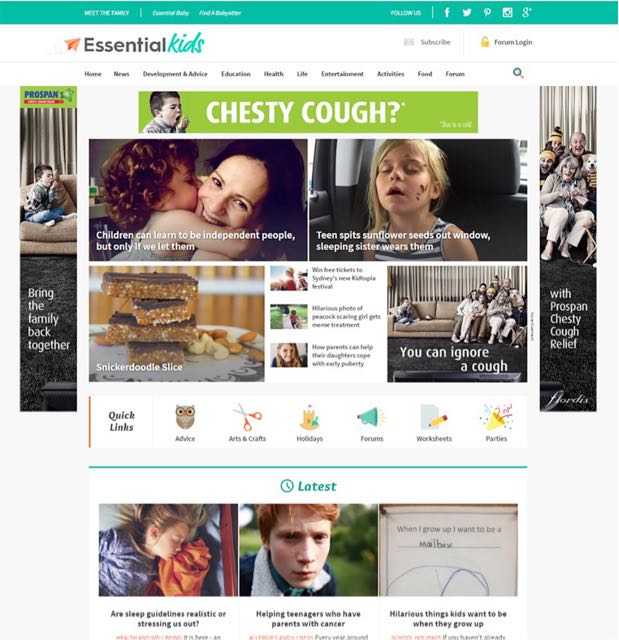Prospan creates algorithm to predict coughs in brand new hyper-targeted campaign via Affinity
 Data-driven media, CX and advertising agency Affinity has created a cough simulator to predict when a child is likely to come down with a cough as part of hyper-targeted campaign for natural medicines company Flordis.
Data-driven media, CX and advertising agency Affinity has created a cough simulator to predict when a child is likely to come down with a cough as part of hyper-targeted campaign for natural medicines company Flordis.
Wanting to reach mums of children who were about to come down with a cough, the independent Sydney agency developed a programmatic buying campaign for 65-year-old natural cough syrup, Prospan, that has already delivered a click through rate increase of more than 76%.
Affinity used first party and search data, overlaying it with social, search strings, temperature, pollution and Medicare data to build a cough simulator. It then used a multi-variant regression model to test thousands of factors, whittling them down to the core contributing factors that lead to a cough. An algorithm was then created that could predict a cough.
So what makes you get a cough?
The Affinity team discovered the incidence of cough increased when there was a temperature differential of greater than one standard deviation of the rolling average of the last three months of local weather, logarithmically weighted towards the most recent period.
Or put more simply, a cold snap is all it takes to catch a cough, but how cold that ‘snap’ needs to be differs depending on your location and the recent weather there.
For example, locations with a greater midday to midnight temperature variance like Hobart, needed a drop of two degrees. Whereas locations in Far North Queensland with much more consistent temperature could take as little as a 0.2 degree difference for concerned parents to flock to rush in to buy a cough remedy.
But location itself wasn’t the whole picture, if temperatures over the past month has been consistent with a slow curve up, or down, it took next to nothing to get people coughing.
Based on these findings, Affinity built a weather-polling app and set its programmatic buying to correlate with 18 different locations across the country where Prospan had strong product distribution. When the temperature fluctuation rules were met, the algorithm dictated when and where budgets should be minimised, or increased in real-time.
Since the campaign launched, unit sales of Prospan’s Children’s cough range increased over an eight-week period by 27% compared to the same time last year.
Says Luke Brown, CEO, Affinity: “We’re realising the promise of data-driven marketing for brands, rather than just talking about it. The combination of creative, intuition and empiric information is formidable when applied to well defined business problems. And it doesn’t demand big budgets or expensive data solutions. It’s about being smarter and outcomes focused.”
Says Michael Aylward, group marketing manager, Flordis: “We brought Affinity onto our team looking for a data driven approach and to make our digital media budget work smarter for us. They’ve delivered. We’re already changing our approach to market across all our brands to leverage data that drive superior insights and media efficiencies. Based on our early work with Affinity, we’re confident this will translate into commercial success.”
This latest work follows Affinity’s Australian first in outdoor advertising, when in conjunction with oOh!media, it delivered the first hyper-targeted and personalised messaging campaign for ADMA. It comes after a campaign for Narellan Pools won a string of local and international media, data and effectiveness awards including a prestigious IPA Effectiveness Awards and five Australian Effie Awards including a Gold.

4 Comments
Would you fuck off and come up with an idea. No one cares and no one will notice. In real time.
FFS
really?
Clever.